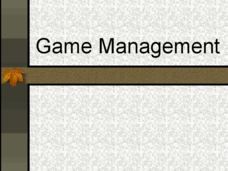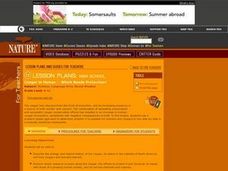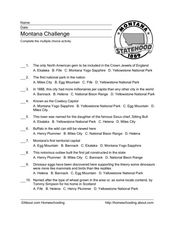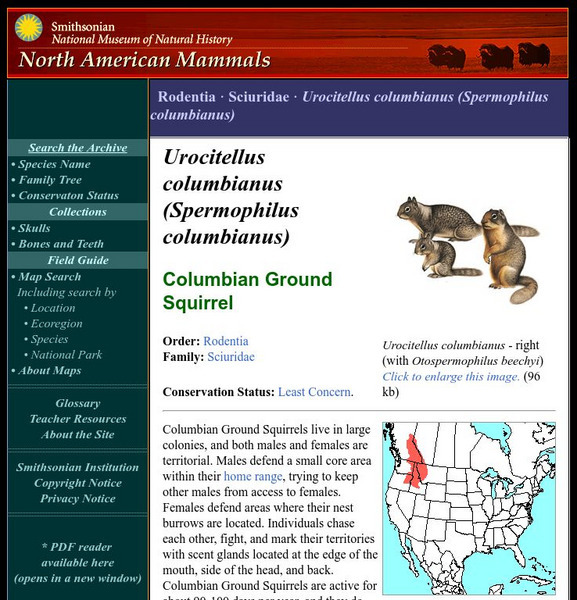National Park Service
Leave it to Beavers
Many people know cats mark their territories by rubbing the back of their necks to leave a scent, but not many people know beavers also leave a scent to mark their territories. During the first activity of two, scholars use their noses...
Curated OER
“Home on the Range”
Fourth graders analyze the song "Home on the Range" and identify its meaning and setting. In this timeline and retelling lesson, 4th graders use dictionaries to find definitions of unfamiliar words, create a timeline and retell the...
Curated OER
Game Management
Many factors that lead to conserving wildlife are covered on these slides. The meanings and definitions are clear, and the specific topics covered are relevant and complete. This slideshow would be very useful to include in a...
Curated OER
Habitat Awareness
Second graders build a habitat. In this wildlife lesson, 2nd graders work in groups to build a mammals habitat. They share their habitat with the class.
K12 Reader
Coyote: The Survivor of North America
Coyotes in Chicago? Yip. Middle schoolers demonstrate their ability to identify details that support the idea that coyotes are adaptable creatures.
Curated OER
Cougar or Human: Which Needs Protection?
Students conduct Interned research on the cougar, listing perceptions about cougars, and facts about cougars. They view a video, take notes during the video, and organize presentations to present their findings.
Curated OER
Montana Vocabulary Worksheet
In this Montana worksheet, students read ten definitions that pertain to the state of Montana. Students match these to the words they describe.
Curated OER
True Tales of Adventure for Young Part 3
Young scholars explore the Passageways website. They read to compare and contrast the motivations and accomplishments of two explorers.
Curated OER
South African Trivia
In this South African Trivia instructional activity, 6th graders research and answer questions about South Africa. Students write fifty-five answers.
Canadian War Museum
Comparing Primary and Secondary Sources
This simple two-day lesson introduces learners to the differences between primary and secondary sources. The lesson includes group work that explores the similarities and differences, and the advantages and disadvantages of primary...
Curated OER
Great River Bend Adventure
Young scholars use their imagination. They discuss the 4 C's of teamwork: Concentration, Communications, Coomperation, and Consideration. Students discuss the safety guidelines of the project. They complete a rope maze. The group walks...
Curated OER
Wildlife Habitat
Students explain what a habitat is and describe its four elements. They see how an area's habitat suitability varies with different species of wildlife. They name factors that affect habitat suitability.
Curated OER
Florida: Reading Comprehension
In this Florida reading comprehension worksheet, students read a 2-page selection regarding the state and then respond to 10 true or false questions.
Curated OER
Rain Forest Animals
Students create a book about animal species found only in the Amazon rain forest. They find one species to represent each letter of the alphabet, and write each name on a different piece of paper. They illustrate each page with an...
Smithsonian Institution
National Museum of Natural History: American Mammals: Columbian Ground Squirrel
Columbian Ground Squirrels live in large colonies, and both males and females are territorial. Males defend a small core area within their home range, trying to keep other males from access to females. Learn more about the Spermophilus...
















